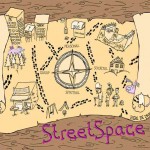We have been playing with the metaphor Here be dragons as a way to describe what we are up to and where we are with Church on the edge. On old maps there is that space simply described as Here be dragons. We are committed to going to a new place with young people and have been off the map for a while now.
We simply do not buy into the language of whos in and whos out, dualism, etc, We recognise the curtain has been torn, the kingdom is now and not yet, the earth and everything it is the lords, follow missio dei and refuse to see mission as a bridge into church but simply collapse the bridge.
We described our approach to being and growing church in this new land to a young person and here is what Sam (18yrs) came up with what do you think? (click it to enlarge)
We build on the idea that we tack (like a ship sailing into the wind) with young people on a journey to become fully human and in the process we discover what it means to be fully human and what it is to be/grow church. In the process I think I have learnt that actually the dragons aren’t that scarey anyway.

